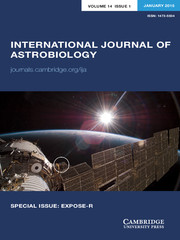Article contents
A postulate to assess ‘habitability’
Published online by Cambridge University Press: 24 December 2004
Abstract
One principal challenge in biology is defining a postulate by which the habitability of other planets can be assessed. Current assessments suffer from two potential weaknesses. With respect to other planets, either assumptions are made about the physical and chemical conditions of environments that err on the side of biological optimism without empirical constraint by spacecraft observations or novel physiologies of microorganisms are invented to fit extraterrestrial environmental conditions with no demonstrated microbiological counterparts on Earth. Attempts to assess the habitability of the early Earth suffer from similar problems. We discuss the following postulate: ‘the proposition that a planet is or was habitable requires that the physiological requirements of microorganisms on Earth known at the time of assessment match the empirically determined combined physical and chemical conditions in the extraterrestrial or early Earth environment being assessed’ as a means of evaluating ‘habitability’. We use as tests for our postulate the early Earth and the cloud deck of Venus (a habitat that has been a source of optimistic debate for forty years). We conclude that, although the early Earth was habitable, Venus is a dead world.
Keywords
- Type
- Research Article
- Information
- Copyright
- 2004 Cambridge University Press
- 10
- Cited by




